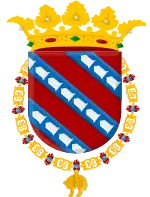Lords of Bucquoy
The Lords of Bucquoy were members of the feudal nobility of the Netherlands.[1] Now part of France, the dominium of Bucquoy was inherited by many important families. The House of Longueval moved to Bohemia in circa 1620.

History
Bushoy, as it was called in old Dutch, was amongst the oldest lands in Artois. It was divided into two parts. Its territory was held by several major noble houses, including the House of Châtillon. Jeanne de Chatillon, daughter of Hughes and the last heiress of her line, married John I, Count of La Marche, who was lord of Bucqoy. In 1688, the dominium became a county at the request of Charles II.[2]
House of Chatillon
Hugues de Chatillon
- Jean de Chatillon;
married to John I, Count of La Marche- Louis, Count of Vendôme
- John VIII, Count of Vendôme
- Jacques of Bourbon, Governor of Valois
- Charles de Bourbon, Lord of Bucqouy
- Jacques of Bourbon, Governor of Valois
- John VIII, Count of Vendôme
- Louis, Count of Vendôme
- Jean de Chatillon;
House of Sterck-Glimes
Gerald Sterck, Lord of Bucquoy;
married to Jossina van den Daele, Lady of Stabroeck.[3]
- Anna Sterck, Lady of Bucoy;
married to Ferry de Glimes, Baron of Grimberghen
- Anna Sterck, Lady of Bucoy;
House of Glymes-Berghes
Ferry of Glimes, Baron of Grimberghen
- Gerard de Berghes, Lord of Bucquoy and Stabroeck;
Married to Anne de Halmale
- Gerard de Berghes, Lord of Bucquoy and Stabroeck;
House of Longueval
Counts of Bucquoy
Maximilien de Longueval, 1st Count of Bucquoy
- Charles Bonaventure de Longueval, 2nd Count of Bucquoy, the general of Habsburg army, moved from 1619 to 1621 to Bohemia, died in a battle by Nové Zámky in Slovakia.
References
- Dictionnaire historique et archéologique du Département du Pas - de - Calais publié par la Commission départementale des Monuments historiques, Volume 2/ Sueur - Charruey, 1874
- Supplément au Nobiliaire des Pays-Bas et du comté de Bourgogne, 1420-1555 ;Jean Charles Joseph de Vegiano (seigneur d'Hovel)
- Supplément au Nobiliaire des Pays-Bas et du comté de Bourgogne, 1420-1555 ;Jean-Charles-Joseph De Vegiano (seigneur d'Hovel)